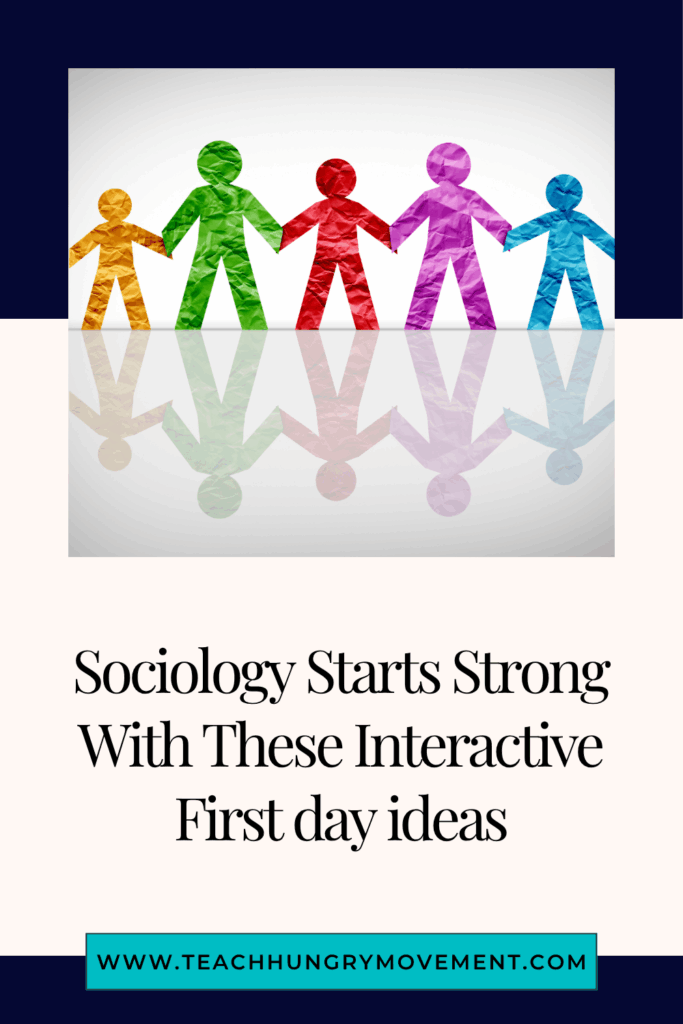Class starts, and everyone’s waiting to see what kind of space this is going to be.
They’re hoping it’s not the kind of class that kicks off with a full-body reading of the syllabus—or makes them question why they even showed up.
And hey—Sociology delivers.
Because this isn’t just another class about names and dates. It’s a class where they get to ask questions like:
- Why do we all face forward in elevators?
- Why are romantic relationships such a big deal in teen culture?
- What is normal?
It’s 100% built for students who like to observe the world around them. And maybe challenge it a little.
FREE: Ultimate Social Studies Bundle

Here are three first-day activities that will get your students intrigued by Sociology.
1. What Would You Do? Culture Shock Scenarios
- What it teaches: Cultural relativism, norms, values, ethnocentrism
- Time: 30–40 minutes
- Best for: All levels of Sociology, especially intro-level students
Start with this prompt:
“Imagine you’re visiting a country where people eat insects as a delicacy. Would you try it? Why or why not?”
Then, break students into small groups and give each group a different culture shock scenario.
Examples:
- In this country, elders are always spoken to last.
- Public nudity is normal in this society.
- People don’t make eye contact while talking; it’s seen as aggressive.
- Everyone eats meals silently. Talking while eating is disrespectful.
Ask each group to discuss:
- What surprised you?
- Would you be comfortable in this society? Why or why not?
- What does this tell you about how your own society has shaped your thinking?
End with a short whole-class debrief:
- What is culture shock?
- What does it mean to be ethnocentric?
- How do norms and values vary between cultures?
Related: Setting Up Your Classroom For ELL Success
FREE: Ultimate Social Studies Bundle
2. The Label Game
- What it teaches: Socialization, labeling theory, self-fulfilling prophecy
- Time: 45–60 minutes
- Best for: Any Sociology class, especially those diving into deviance or identity
Here’s how it works:
As students walk in, tape an index card to their back. Don’t let them see it. Each card has a label like:
- “Troublemaker”
- “Overachiever”
- “Lazy”
- “Popular”
- “Weird”
- “Leader”
- “Invisible”
Tell students they’ll be interacting with classmates but can’t say what’s on each other’s backs. They must treat others as if the label is true. Á la the Diversity Day episode of The Office.
After about 10 minutes of conversation and movement, have students guess their label.
Then reflect:
- What was your label? How did people treat you?
- Did the way others treated you change how you acted?
- What if that label stuck with you for years?
Note: If you’re not comfortable with “weird,” “invisible,” or “lazy,” change them up! It’s the first day of school, and you don’t know the kids yet, so choose words that you are comfortable with.
Related: 3 First Day Economics Activities Your Students Actually Want to Do
FREE: Ultimate Social Studies Bundle
3. “What Is Normal?” Four Corners Debate
- What it teaches: Norms, deviance, cultural expectations, the social construction of reality
- Time: 30–45 minutes
- Best for: All Sociology students
Mark the four corners of your classroom:
- Strongly Agree
- Agree
- Disagree
- Strongly Disagree
Then read a series of statements like:
- “It’s rude to eat with your hands.”
- “You should always stand for the national anthem.”
- “It’s wrong to live with your parents after age 25.”
- “People should be allowed to wear pajamas to school.”
Students move to the corner that matches their opinion, then discuss:
- Why did you choose that response?
- Did you notice generational, cultural, or gender differences?
- Who decides what’s “normal”?
Use this to introduce the idea that norms are social, not natural. Sociology is the study of how we learn and enforce them.
Related: Kick Off Your Civics Class With A Bang: 3 Activities You Can’t Miss
FREE: Ultimate Social Studies Bundle
BONUS:
If you want to hook your students from the very first minute, I’ve got you.
This free activity from Erin at Let’s Cultivate Greatness is an all-time favorite—and I’ve been using it for years.
It gets students thinking about social norms in a way they’ll never forget.
Let’s just say…it involves choosing a urinal.
That’s all I’m going to tell you.
Grab the freebie right here.
+ show Comments
- Hide Comments
add a comment